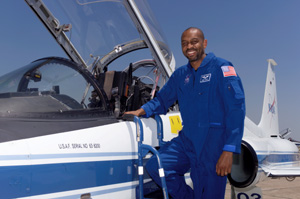December 13, 2005
Astronaut-Physician Continues Research at Northwestern
 CHICAGO—In May 2004 Northwestern University orthopaedic surgeon Robert L. (Bobby) Satcher, MD, PhD, was one of two physicians selected for NASA’s 2004 astronaut class. The 11-member group began training last summer at the Johnson Space Center in Houston.
CHICAGO—In May 2004 Northwestern University orthopaedic surgeon Robert L. (Bobby) Satcher, MD, PhD, was one of two physicians selected for NASA’s 2004 astronaut class. The 11-member group began training last summer at the Johnson Space Center in Houston.
A specialist in child and adult bone cancer, Dr. Satcher joined Northwestern in 2001 as an attending physician at Northwestern Memorial and Children’s Memorial Hospitals. Although he is on leave, Dr. Satcher still is conducting research at The Robert H. Lurie Comprehensive Cancer Center of Northwestern University and the Institute for BioNanotechnology in Advanced Medicine.
Dr. Satcher brings his experience to NASA at a key time, when it’s working to fulfill the new Vision for Space Exploration. The vision calls for NASA to focus its research efforts on studying the effects of long-duration space flight.
“One problem when it comes to living and working in space is bone loss. I’m interested in looking at ways of preventing that,” Dr. Satcher said.
“It’s difficult to predict what the benefits of space travel and space-based research will be to those of us on the ground,” he said. “There are things in our lives today—things that have transformed society—that are simply the rest of the exploration.”
Dr. Satcher will graduate from astronaut basic training in January 2006.
He took a few minutes out of his busy schedule to talk to University Relations health sciences editor Elizabeth Crown about his NASA experiences and what the future holds for this physician-researcher-astronaut.
Has your NASA experience been as extraordinary as you’d expected?
It’s unlike anything I’ve ever done. I’ve had no dull moments. It’s been a wonderful experience.
I came here to become eligible to go into outer space. It’s been especially exciting with the space shuttle starting to fly again. To some extent, all of our hopes are riding on that.
We are coming to the end of our basic training, at which point we will become eligible for flight assignments. The “graduation” ceremony for our class will take place mid-January.
What does basic training consist of?
We have classroom work, and simulations for the space shuttle and the space station that are done in full mock-ups of the vehicles. We’ve also had and continue to have extensive physical training, because we’re required to maintain our physical fitness.
We’re doing outdoor expedition training to simulate situations that one would experience in space. This includes focusing on group dynamics, working in stressful situations, and learning outdoor skills to prepare us for environmental exploration.
One of the most exciting prospects is that we will train at the NEMO laboratory, 60 feet under the water off the coast of Florida. NASA joined with the Marine Resources Development Foundation and NEMO to simulate the isolation conditions of a long-term space mission, placing aquanauts in an undersea habitat for given periods.
We will train there to simulate a long-duration expedition, such as that envisioned for the exploration of the moon or Mars. We will conduct experiments and do exploratory work, including scuba diving.
Some of the previous research that has been done there includes studying how to perform surgery and other interventional procedures in this environment.
What kinds of experiments will you be doing there?
We will be learning that in next few months. NASA tries to make sure that we make practical use of the skills we brought to the program, plus those we’ve acquired in the program.
My research prior to coming to NASA focused on how bone responded to physical stresses. I haven’t started research at NASA yet because of basic training.
How has your life changed since you’ve lived in Houston?
My family and I have adjusted well.
It’s been a very busy period for us here, although not unlike the pace I was accustomed to as an orthopaedic surgeon and researcher in an academic medical center in Chicago.






